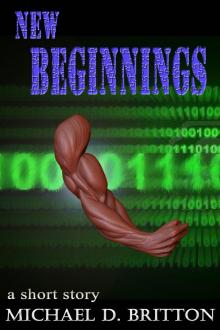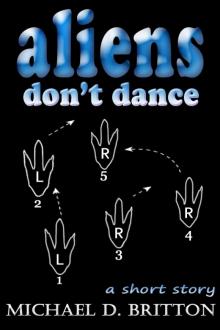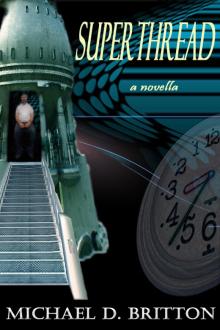- Home
- Michael D. Britton
Next Phase
Next Phase Read online
Next Phase
by
Michael D. Britton
* * * *
Copyright 2012 by Michael D. Britton / Intelligent Life Books
“Is it over?” asked Brent, unable to control the trembling in his voice.
“For now,” said Jacob as they crouched in the shadows atop a pile of concrete rubble. “C’mon.”
Jacob led the way out of the remains of the gray cinder block bomb shelter and out into the night. Acrid smoke filled the air and an orange glow emanated from the horizon in all directions, like a bizarre sunset. A hovering trail of blue lights could be seen silently snaking away into the distance about a hundred meters off the ground.
“The Chi-drones are gone for now,” said Jacob. “But they’ll be back. Let’s return to headquarters and get to work.”
Brent straightened his helmet and sighed, grabbed his gear and followed Jacob between the long-abandoned buildings. After a few minutes they arrived at headquarters and got scanned, then headed downstairs to bunker Level-15 in a high-speed elevator that smelled like diesel.
“We need to finish the programming of the next generation of Liberty-drones, or the Caliphate’s gonna finish us off,” said Jacob, referring to the enemy of freedom that had started this war so many years ago.
“Let’s talk to Bart. See if he can reassign some programmers to our team,” said Brent.
Jacob punched in a command for the elevator to take them down to Level-18. The two military technologists stepped out of the elevator, headed down the corridor past the guards, and knocked on their boss’s door.
“Yeah,” said Bart, not looking up from his screen.
“Sir, we need to requisition some resources now if we’re going to get the next phase produced in time to hold off the next major assault,” said Brent.
Bart looked up, confused. “Who are you? Do you two work for me?”
“Uh, yes, Sir. We’re Brent Peterson and Jacob Polanski. We’ve been in your unit for three years now. You ask us that every time you see us.”
“Oh. Yeah, well, I’m just testing you. Why don’t you go talk to Shanni about personnel? I’m busy getting recon from field units about the last attack. That one was close!”
Without another word, Brent and Jacob turned and left.
“Close, feh!” said Brent under his breath. “He was tucked away safely here at HQ while we were out there running field tests. He doesn’t know what close is.”
The two went down another two floors to see Bart’s civilian superior, Shanni Downs.
“Knock, knock,” said Brent, leaning into the open doorframe and peering into the well-appointed office.
“Yes?”
“Um, Ms. Downs, I’m Peterson, this is Polanski. We’re in Robotics – actually, we’re in the subgroup, Neural Interaction and Predictive Personage Interfacing.”
“Ah yes, NIPPI. I recall when I was just a grunt in the NIPPI subgroup. Have I ever told you about the time I was asked to head up the whole Robotics Division?”
Before they could answer, she launched into her vocalized reverie, smiling dreamily into the ceiling, off in her own world.
“I was having lunch with General Shorter – who’s now commander of all eastern operations – and he kept telling me that I was the best person for the job. Now I really didn’t want the job – I was perfectly happy as Director of NIPPI. But he wanted me. He wanted me bad.”
Brent and Jacob stood there for a full fifteen minutes while the self-aggrandizing egotist rambled on aimlessly, reciting her life story ad nauseum in excruciating detail. Suddenly she stopped and squinted at them.
“Did you two need something?”
“Yes. We need more bodies in NIPPI to help us get Generation 23 of the Lib-drones rolled to production before deadline. As I’m sure you know, Command is expecting another major attack within the next six days.”
“Oh, sure,” Shanni said with a smile. “Take four programmers from each of the other five Robotics subgroups. Whoever you want, I don’t care. Here, take this order with you – it’ll give you authority to do what you need.”
“Thank you, Ms. Downs,” said Jacob, taking the electronic order form.
“Please, call me Shanni. By the way, have I ever told you about the time General Markus asked me to lead a special team on neural interfacing for the president? Oh my gosh –”
“Actually, we need to go,” said Brent, cutting her off and making a hasty exit with Jacob.
“I’m starting to worry about the leadership, here,” said Brent, as they headed back down the hall.
“I know what you mean,” said Jacob. “They’ve been cooped up too long away from the real action. They just experience all of life through their screens, surrounded by life-long bureaucrats. And they’ve been managing this war for so long, I just don’t think they understand how bad it’s getting out there.”
The war was going very badly.
No longer was it a matter of soldiers and strategy – it was about who could develop smart weapons the fastest, and who had the will to use the latest technology without regard for the political ramifications.
The Generation 23 Liberty-drones were at the cutting edge – they would be able to detect enemy intentions through a neural scan and make logic-based decisions that could be transmitted to the entire battalion of drones. Strategies could be developed, plans could change, and platoons be redeployed based on the shifting circumstances on the ground – all detected by the lifeless, yet lifelike drones.
The component of intention-detection was critical these days, since it was becoming very hard to tell who was who. Guerilla warriors and terrorists were impossible to tell apart from civilians, local law enforcement, or even the Coalition’s soldiers. The enemy forces had become masters of disguise, and the only way to distinguish them was through neural scanning.
Some human rights activists criticized the use of intention detection on the grounds that it violated people’s privacy, but while their objections were tied up in the courts, MTA moved forward with the operation, no time to waste.
The U.S. Militel Tech Agency, or MTA, was a hybrid organization comprised of armed forces and contracted civilian scientists. MTA had assigned Brent and Jacob to their front-line research, development and production facility, or RDP, which was located in the arid wasteland that used to be southern Iran, nearly six years ago.
Back then, things were looking brighter, as Coalition technology was outpacing Caliphate technology with a broad lead. But then the Caliphate started getting supplied with tech from China, and the tide began to turn. While war raged in the Middle East, China had absorbed Japan and the Koreas, along with the technological abilities of those countries.
The Chinese-made drones, or Chi-drones, employed artificial logic and reasoning systems that shattered the existing paradigm of robotic warfare. These machines could think in ways that made Coalition automation look like a model train set. U.S. leaders decided to pour all available resources into catching up to and surpassing the Chinese tech.
And they did.
They could never keep up with the sheer number of drones the Chinese could produce and sell to the enemy, but the MTA products were faster, more powerful, and smarter.
“Alright team, listen up,” said Jacob, standing at the railing on the mezzanine of the large programming room, addressing the NIPPI subgroup below, including the twenty newly assigned programmers. His voice echoed in the sterile room. “We have six days to get fifty thousand Generation 23s to the field. Counting the forty-eight hours needed for production, that means we have only four days to complete the programming functions, test the lead drone prototype, and put in the order to Manufacturing. I want you to break up into teams of five. Look on your wrist screens – you’ll see the specific codin
g areas that need attention. If you have questions, talk to Brent or me. Let’s do this.”
“Nerds to the rescue, eh?” said Brent quietly.
“I never thought it would come down to this, Brent, but these guys and gals may be our only hope. If they can write the code to make the G23 do all it’s supposed to, without error, we’ll be able to turn everything around and win this. If not – well – I hope you’ve brushed up on your Arabic – you’re gonna need it in the global caliphate.”
“In a global caliphate, I’ll be dead,” said Brent. “Don’t you know? They’ll force conversion of most, but they don’t accept Jews or Latter-day Saints at all. They just kill us outright.”
“Oh. Well, I guess you better get down to the data floor and start hammering out code, my friend.”
Brent nodded and said, “You too. This is one hairy deadline we’re facing.”
The two men got to work, putting in rotating six

 Turn the Page
Turn the Page Checkmate
Checkmate A Slave to Race
A Slave to Race The Only
The Only Convergence
Convergence Red Death
Red Death New Beginnings
New Beginnings Liberation
Liberation Old Wounds
Old Wounds Aliens Don't Dance
Aliens Don't Dance Tag-Alongs
Tag-Alongs Broker
Broker Pause
Pause Predict THIS
Predict THIS AaBack's Grimm: Dark Fantasy Fairy Tale #2 Friends Reunited: The Janus Beast, The Rose Beauty, And The Cursed Duckling
AaBack's Grimm: Dark Fantasy Fairy Tale #2 Friends Reunited: The Janus Beast, The Rose Beauty, And The Cursed Duckling Unsettling Things & Other Stories
Unsettling Things & Other Stories Ask Grench
Ask Grench Strings
Strings Going to the Dogs
Going to the Dogs Switch
Switch Statute Forty-Nine
Statute Forty-Nine Brain Storm
Brain Storm Royal Flush
Royal Flush Time and Again: A Collection of Crazy Chronology
Time and Again: A Collection of Crazy Chronology Edge of Human
Edge of Human A Sense of Souls
A Sense of Souls Decisions, Decisions
Decisions, Decisions Dream Soldiers
Dream Soldiers Spies: 7 Short Stories
Spies: 7 Short Stories Prowler: Three Haunting Tales
Prowler: Three Haunting Tales The Release
The Release Lunar Tales - an anthology
Lunar Tales - an anthology Surge
Surge Sole Survivarrrgh
Sole Survivarrrgh Remember
Remember Superthread
Superthread Deceive the Paradox
Deceive the Paradox Project: Dreamer
Project: Dreamer No Man to Trifle With
No Man to Trifle With Diaspora
Diaspora Quartet for Three
Quartet for Three The File
The File These Dark Electrons
These Dark Electrons Honored: 7 Honorable Mention Stories from the Writers of the Future Contest
Honored: 7 Honorable Mention Stories from the Writers of the Future Contest Balls
Balls The Final Testament
The Final Testament The Exile
The Exile OtherPlace
OtherPlace